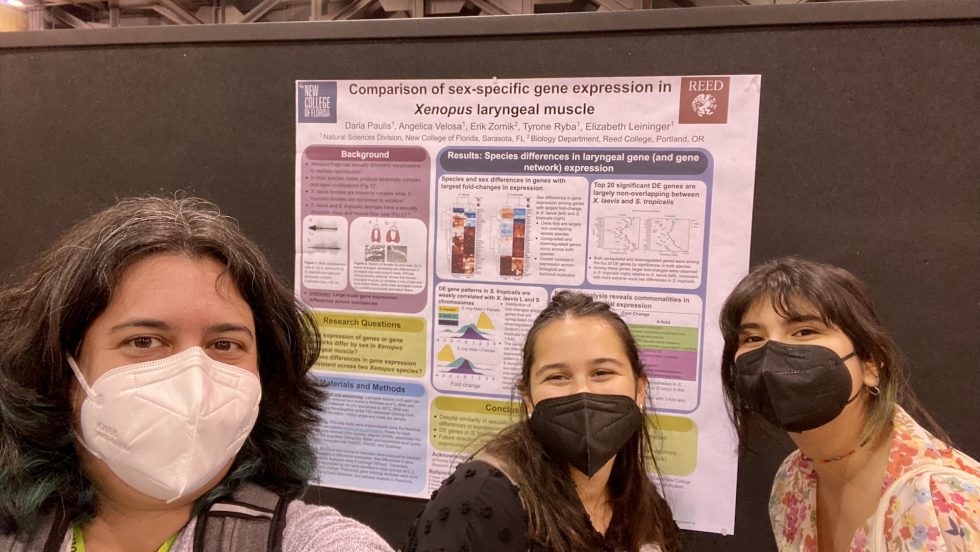Student Research and Travel Grants help students discover their future

4th year students, Angelica Velosa and Daria Paulis are two peas in a pod. They both went to the same high school in Miami and are both studying neuroscience. They, like many other New College of Florida students, refer to themselves as nerds. Daria says, “Every new college student who is successful here is really nerdy about whatever their thing is. And whether that’s science, literature, theater or arts, whatever your thing is, you are a nerd about your thing. Coming to a community of like-minded people, everyone is really passionate about their passion.”
Angelica and Daria jointly received a Student Research and Travel Grant to present their research on African clawed frogs under the tutelage of Professor Liz Leininger. Both talked passionately about these frogs which are sexually dimorphic meaning that they have really extreme sex differences outside of their reproductive organs. The grant allowed them to present a poster at the Society of Integrative and Comparative Biology this past January in Phoenix, and paid for the conference fee as well as travel, hotel and food expenses. Dr. Leininger says “Daria and Angelica presented research they had done with me and Dr. Tyrone Ryba to an international audience of biologists. They fielded questions from undergraduate and graduate students, as well as renowned professors in the field. They were able to engage in high-level conversations about their work and we received excellent feedback on how to proceed with the project.”
Daria says, “it gave us an opportunity to talk about our work and get perspectives from people who know nothing about it.” For Angelica, it rejuvenated her passion, saying “talking to other scientists gave me great motivation. We got to sit in on other talks about other animals – frogs, birds, starfish, octopus, snakes. It was such a diversity of animals. Most people who study neuroscience only study mice, rats, and rodents in research.”
Daria and Angelica’s project is a testament to how New College can support synergies between teaching and research. Dr. Leininger says, “Both of them first learned about my research in my Neurobiology lab, which is designed as a course-based research experience. In other words, they got to participate in research just by signing up for a course in the fall of their 2nd year! That experience led them to pursue ISPs and research tutorials in subsequent semesters. Daria’s thesis project further followed up on this research as well. In this way, I’ve been able to teach Daria and Angelica (and other students like them) the authentic process of science as part of my regular teaching.”
Daria, whose AOC is Biology and Neuroscience will head to Boston this summer to begin a two-year fellowship in neuroscience at Harvard Medical School. Angelica’s AOC is similar with an emphasis on Biological Psychology. She will be doing research at the University of Minnesota. Both hope to go to grad school, get their Ph.D. and teach. Daria’s dream is to one day run a lab and an after-school science-based program for K-8. Angelica wants to lecture on neuroscience and possibly go into Discipline Based Education Research (DBER), a new field that seeks to develop evidence-based knowledge and practices that improve teaching and leaning in the science, technology, engineering, and mathematics (STEM) disciplines.
Their SRTG was generously provided by New College alum Gregory Dubois Felsmann “77, who is now a renowned scientist and physicist. Angelica says, “I so appreciate the financial support he gave. It would have been a lot harder without the support. And if I hadn’t gone to the conference, I may not have decided to stay in science.”
Dr. Leininger offers her appreciation to donors like Felsmann who believe in the power of New College. “Thank you for supporting our students in reaching a high level of academic and professional accomplishment. Conference travel (which is not always cheap!) can be a game-changing experience for students, and opens doors for them down the line. I suspect that the experience of doing research and presenting it to a professional audience played a part in helping Daria and Angelica decide to apply for, and gain admission to, competitive post-baccalaureate research fellowships in Neuroscience.”
